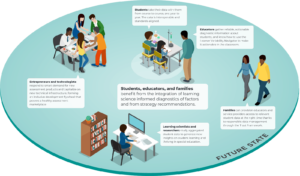Joy & Rigor: The And-Both Solution

Is it possible to create a high-engagement school where students do interesting and relevant work and meet high expectations? Erin Mote and Eric Tucker are a smart duo developing Brooklyn Laboratory Charter School (LAB) and they think the answer is decidedly YES.
Admittedly, they haven’t figured it all out but they have seven months before 132 sixth graders show up at their school in the heart of downtown Brooklyn near the Farragut housing projects.
The joy-rigor paradox that they have embraced reminds me of another favorite Next Generation Learning Challenges (NGLC) winner—a “no excuses” blended Montessori mashup launching in Austin. Both teams are embracing the learning design opportunity of our time —combining interest-based and standards-based learning. Like LAB, Summit Denali, another NGLC winner, uses playlists of mostly open content (on the open platform ActivateInstruction) to prepare students for project work, making it the best early example of personalized and project-based learning.
Seeing gaps and opportunities in the EdTech landscape, Mote and Tucker plan to develop a custom UX and common/open backend that has the potential to be shared with other NGLC grantees—an EdFi/RESTful operational data store. The dynamic duo thinks a platform can be assembled utilizing open API components from the United States Department’ of Education’s Learning Registry, Dell Foundation’s EdFi.
My last conversation with Mote and Tucker inspired 10 Learning Platform Axioms and thoughts about 10 Elements of Next-Gen Learner Experience (LX). Platform development is not for the faint of heart, but as a knowledgeable technologist, Erin has helped wire entire countries and Eric is an experienced educator who has learned a lot from folks like David Coleman.
They are assembling a teacher team and looking for a couple talented partners to help build and launch what will be an important and interesting school network.
For more, see NGLC school profiles and check out the three part review of the 20 wave 3 grantees:








0 Comments
Leave a Comment
Your email address will not be published. All fields are required.